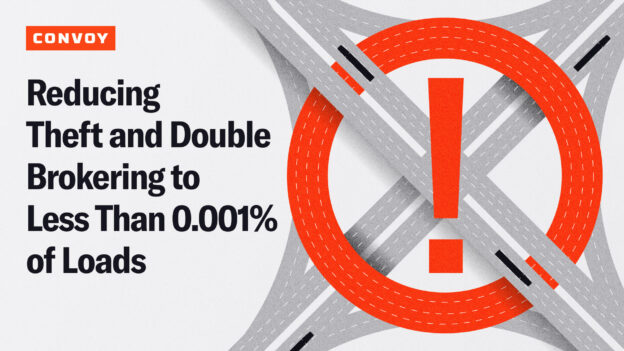Saving big and securing coverage in every market cycle with Guaranteed Primary
Shippers • Published on September 23, 2022
Following two years of high demand for freight due to COVID-19 related lockdowns, the market shows signs of softening as consumers shift focus to the purchase of services over material goods. On FreightWaves’ award-winning What The Truck?!? podcast, Convoy VP of Sales Spencer Hennigar shared how shippers can still save big and get full coverage across market conditions.
Navigating market volatility with technology-driven solutions
Unlike previous cycles, technology has taken on a more prominent role. “In the last three years, there has been an influx of new technology for transportation and procurement and an influx for adoption,” said Hennigar. “We’re seeing more of our shipper customers increasing their willingness to try dynamic pricing solutions like Guaranteed Primary that we have here at Convoy.” A desire for technology-driven programs derives, in part, from the need to stay resilient in the face of volatile market conditions.
As Hennigar discussed, the industry tends to think about the ebb and flow of market cycles in terms of win-loss scenarios. When the market is tight, trucks are hard to come by and when the market is soft, shippers may think that they’re overpaying for freight. In 2020, Convoy launched Guaranteed Primary as an industry-first freight procurement solution that addresses those win-loss scenarios and helps shippers navigate market volatility.
In a tight market, Guaranteed Primary offers 100% tender acceptance. In a softening market, Guaranteed Primary customers realize cost savings without the need to renegotiate contracts due to Convoy rates automatically adjusting as the market shifts. “We collaborate with our shippers and introduce automation to lower some of their costs to serve, accessorials, and incidental costs on a shipment by shipment basis. Those savings are passed on immediately and it’s all automated,” Hennigar added.
When enrolling customers’ lanes in Guaranteed Primary, Convoy stresses flexibility. “We meet our customers technologically where they want to be met, whether that’s through a TMS or directly into their operating system,” said Hennigar. The resulting benefits are huge. Convoy customers enrolled in Guaranteed Primary save an average of 11% on their freight and receive 17% higher tender acceptance.
Staying ahead of the market
To stay ahead in the market, Hennigar recommended three key steps:
- Diversify your freight procurement profile: It’s not enough to diversify the assets and non-asset providers, shippers need to diversify the freight procurement mechanisms within their network. Having dynamic pricing mechanisms like Guaranteed Primary can help mitigate costs and service disruptions.
- Raise the expectations for operational visibility: Shippers should have detailed insights into their freight performance, which is why trust and transparency are built into Guaranteed Primary. With monthly performance reports down to the lane level, our customers see their estimated savings and key shipment metrics to improve their operations.
- Introduce resilience into your network: The more flexibility and elasticity that shippers can introduce into their supply chain, the better. “Whether that’s through a diversification of partners or pricing mechanisms, if you have the right resilience in your supply chain, you’ll be able to forge the future that much more effectively,” said Hennigar.
Getting started with Guaranteed Primary
New to Convoy? Let’s talk about shipping with Convoy and saving more with Guaranteed Primary.
Already ship with Convoy? Get in touch with your account manager.
More resources on how dynamic pricing helps shippers:
- In our webinar, Adapting to Freight Market Softening, learn how industry-leading shippers are driving innovation with dynamic pricing programs while avoiding the inefficient, cumbersome process of renegotiating freight contracts.
- Unlock more savings through Guaranteed Primary: See how a Fortune 50 Retailer’s pilot led to an estimated $1.6 million in savings.



